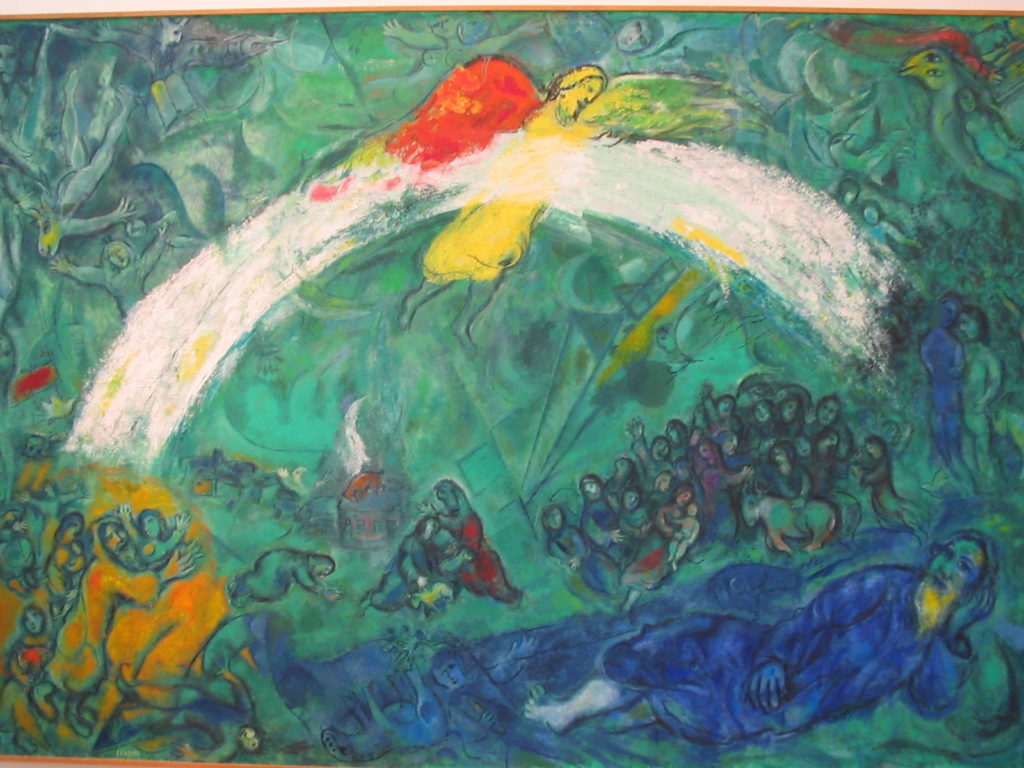Rabbi René’s sermon for Parashat Noah
“Noah ish tsaddik tamim haya bedorotav; et ha-Elohim hit-halekh Noah – Noah was a righteous man; he was blameless in his age; Noah walked with God” (Genesis 6:9 – JPS translation).

Walking with God
Tsaddik and tamim appear here for the first time in the Torah (cf. Sarna’s commentary on Genesis). A Tsaddik is a man whose conduct is beyond reproach, and this quality is reinforced by tamim, a word used for unblemished animals used for sacrifices in the Temple of Jerusalem. Nevertheless, as it is very often the case with biblical characters, Noah is far from being a flawless hero. He is said to be “walking with God”, which means that he spent his whole life in full accord with God’s will, and yet, he did not prevent the flood.
Corruption and lawlessness are rapidly spreading all over the earth, and the Creator of all living beings wants to put an end to it. He wishes to make Noah an instrument for survival of mankind, and He tells him about his plan. Noah obeys without questioning God’s plan against humanity. He does not argue, as Abraham will do in the future. He does not pray to God to spare his fellow human beings, as Moses will do in the wilderness. And yet, he is called a “righteous, unblemished man”. What kind of righteousness is this? In his Torah commentary, Harvey Fields quotes several commentators of the past[1]. “The Zohar explains that Noah was out to save himself and his family. He did not intervene or speak up for the people of his generation when he was told that they would be destroyed” (ad. loc.). In other words, Noah was completely “walking with God”, following His commandments, living ethically, so that he could feel self-justified. He could have prevented the flood by arguing with his fellow human beings and with God, but he was so self-centred, self-righteous, that he let the catastrophe happen.
A “righteous” person in a fur coat…
Harvey Fields quotes a story told by the 18th century Chassidic master Rabbi Elimelech of Lizensk. He “once observed that there are two kinds of ‘righteous’ persons: one who is genuinely ‘righteous’; the other dresses like a ‘righteous’ person in a fur coat. Each of them faces a freezing winter in a different way: one will go out and collect wood for a fire; the other will wrap himself in his fur coat. The one who collects wood lights a fire and invites others to join him. He not only warms himself but others as well. The one who makes himself cozy in his own heavy coat is secure, but those around him will freeze”[2].
So, what does it mean to be a righteous person? Is it only by following God’s commandments that one earns this title? Can one be called a righteous if s/he does not inspire others, or if s/he does not refuse to share information that might save lives? And what about the duty of care, of critical thinking?
We may be tempted to build our own arks
Is violence and lawlessness a natural state for humankind, or is there something else, the sentiment that we can build a better society by working together? It is true that we have a strong tendency to selfishness, to look only into our own tribe, our own garden and to be blind to the suffering of our world. Maybe we feel powerless. Maybe the task seems impossible to attain.
We are going through a global crisis, a pandemic that doesn’t show any sign of receding just yet. And we may be tempted to build our own arks, and to succumb to an attitude of après moi le deluge, a French expression that means, I don’t care what happens beyond my limited and selfish self.
The righteous of today
And yet, look at what is happening: our societies are not collapsing. The foundations of our world are indeed shaken, but there is a way out.
The righteous of today are not those who wrap themselves in self-righteousness or who are right thinking and the measure of everything.
The righteous of today are you and me, those who are trying to keep our world running, those who, instead of hiding in an ark, decide to go out, to reach out to other people, and to keep our society in order.
I don’t like Noah
I don’t like Noah, maybe because I can see myself in his response to the catastrophe. If I am honest with myself, I too was tempted to build an ark and to hide in it, because I felt powerless in the face of the current crisis.
But I know, we know that if one person cannot change the world, it becomes possible if we all work together to create a better future. And then, I feel strong, empowered, because you are with me, because together we can achieve miracles and create a better world.
Let us come together
So, KLS, let us come together, and let us dream, imagine and create a better post-Covid world, and let us share with others our vision of a humanity that is renewed.
Ken Yehi Ratzon,
May it be God’s will
[1] Harvey J. Fields, A Torah Commentary for our Time, (UAHC Press : New York, 1990, p. 30).
[2] Op. cit. p. 31.
